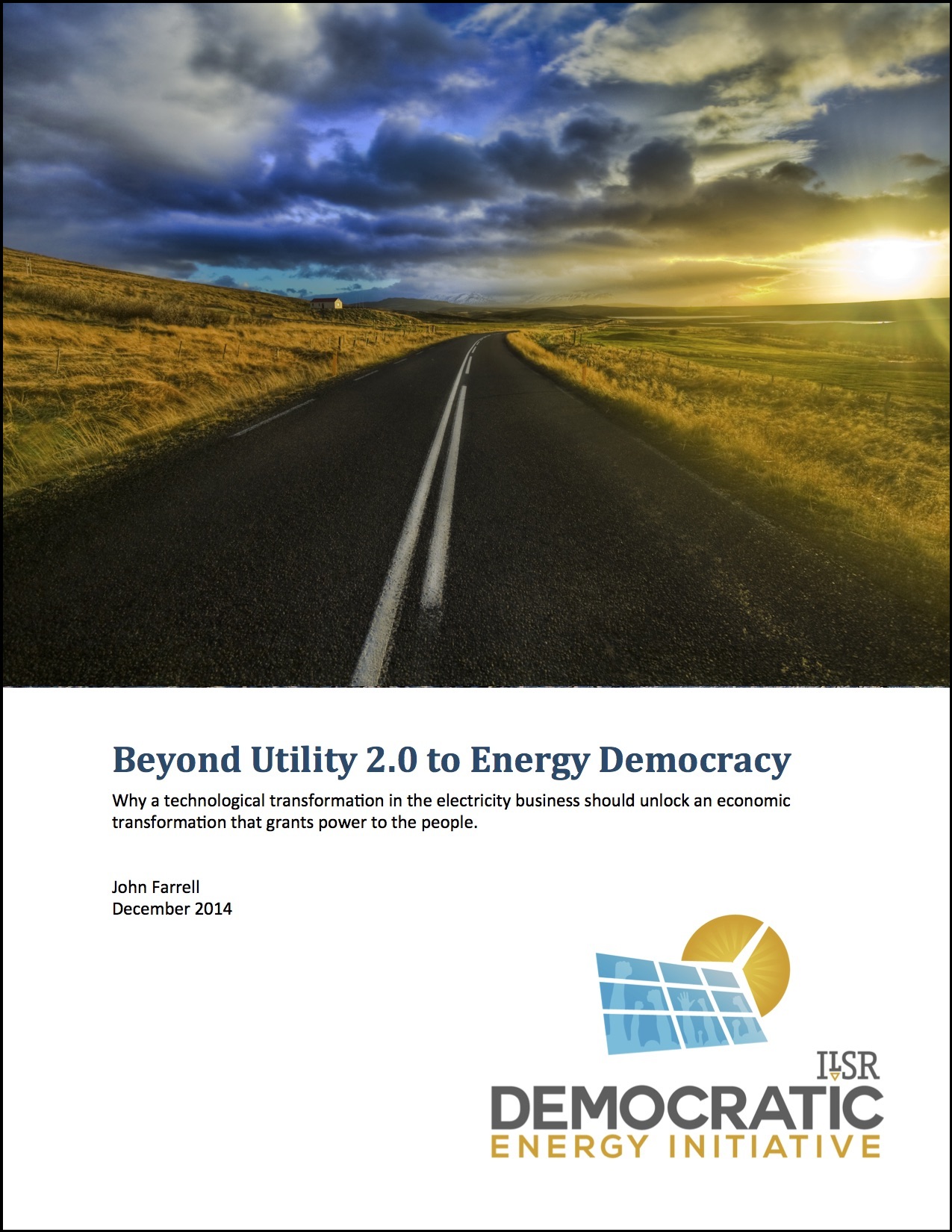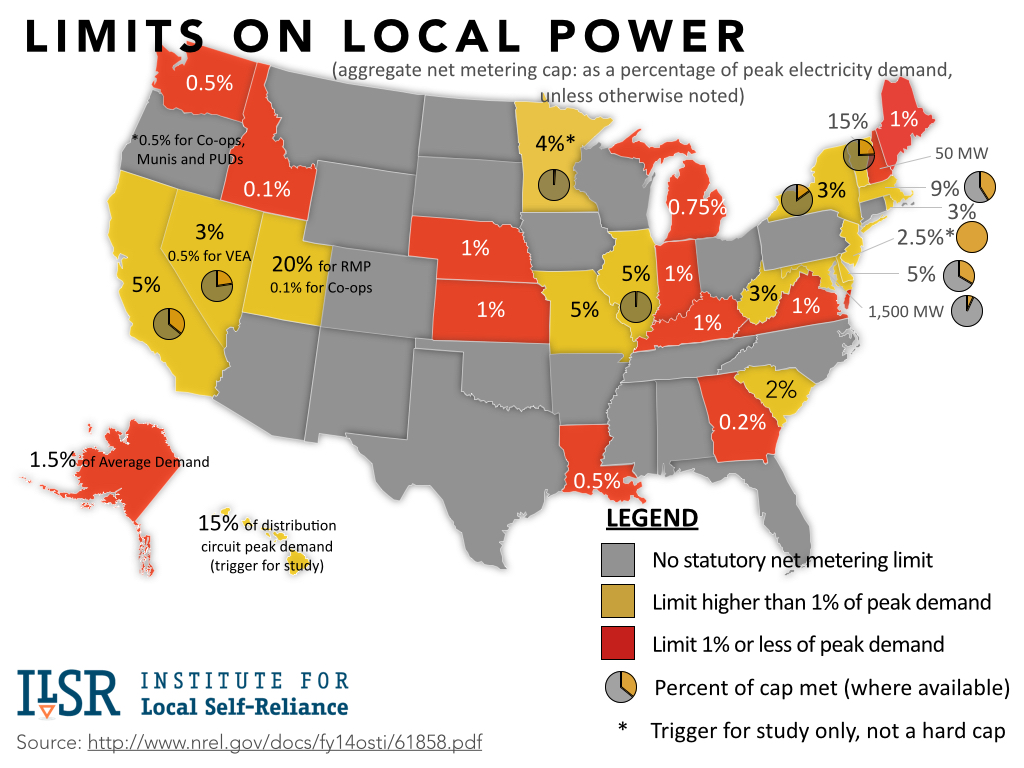Over the last two weeks in democratic energy, media reports discussed a serious threat to Minneapolis’ recent city-utility partnership, why conservatives are embracing solar, and more.
ILSR’s own John Farrell was cited in Utility Dive, in Robert Walton’s article, “Will Santa Fe be the next city to municipalize its electric utility?” Walton reports:
“John Farrell, director of Democratic Energy at the Institute for Local Self-Reliance, led a group called Minneapolis Energy Options that was closely involved in the green energy push in that city. But in Minneapolis the threat of municipalization was mostly that—a threat, and potentially a model for how cities can prod traditional utilities to provide greener power.”
“But Santa Fe, said Farrell, appears ‘a little bit more determined on the actual push towards municipalization.’”
“‘They actually raised the money to do a study, to show both the costs and from a clean energy standpoint what they thought a municipal utility could deliver in comparison to the incumbent utility,’ Farrell said. They’re ‘pushing for a particular solution.’”
Unfortunately, shortly after receiving the Climate Action Champion award from the White House – which recognized Minneapolis for its first-in-the-nation city-utility partnership – the city council voted to halve the partnership’s budget. Farrell writes:
“We’ve come too far to let a little budget fight kill the first-in-the-nation city-utility partnership, but we need your help letting city council know that we can’t secure a better energy future on a shoestring budget. Join us at the city council hearing on Dec. 10 at 6:05pm to let city council know we can’t cut our energy future!”
To find location info for the city council hearing or to find the contact info for your elected council member, click here.
In her article, “A Thanksgiving miracle: How my Tea Party uncle and I found something to agree on,” Lindsay Abrams of Salon sits down with her uncle to discuss their mutual support of solar and why solar is gaining support among conservatives:
“Sure, our reasons for embracing renewable energy differ slightly: I dream of a world where all fossil fuels are left in the ground, while Uncle Mike enjoys the immediate pleasure of watching his electricity meter run backward (he sings the praises of his heat pump, his tankless water heater and his LED lightbulbs for the same reason). And we still don’t agree on all of the details about how it should be implemented. We both really like the idea of cleaner air, though. Something else we discovered we have in common? We hate that the Koch brothers are trying to get taxes imposed on residential solar systems.”
The conservative embrace of solar can likely be linked to the technology’s increasingly attractive investment potential. Sheryl Carter, co-director of NRDC’s energy program in San Francisco, shared her perspective on the investment potential of energy efficiency on EnergyEfficiencyMarkets.com:
“A new report by utility and finance experts contains positive news for the environment, our air and our (and our utilities’) pocketbooks — the economics of electric power resources have made zero-emissions energy efficiency and renewable energy technologies the most financially attractive options to meet the nation’s future energy demands.”
Greg Guthridge of EnergyBiz reports on what he calls “prosumers,” energy consumers producing their own energy and, “in some cases, selling it back into the grid.” Guthridge explains:
“Globally the utilities industry is facing unprecedented market shifts. Rapid technology advancements and growing adoption of distributed generation, smart technologies and connected home products and services are just a few of the shifts affecting energy providers and energy consumers. For providers, energy provision is quickly becoming only a small piece of a large, complex puzzle, and the traditional value chain is giving way to one with bidirectional flows of energy, information and revenue.”
“As the energy marketplace transforms, it is also changing the definition of consumers. Historically, utilities have had one-way relationships with bill payers. However today, environmental awareness, rising energy costs, increasing interconnectedness and declining costs of micro-generation technology-such as solar panels, small-scale wind turbines and energy storage-are creating a new class of consumers-prosumers.
Stephen Lacey of The Energy Collective reported on the need for clean energy markets, rather than mandates or programs. Lacey writes:
“[The] majority of U.S. states have one thing in common: distributed generation is starting to rival traditional resources in cost. And that’s threatening utilities, boosting advocates of consumer choice and forcing regulators to think differently about how the system operates.”
“‘There are a growing number of people across political boundaries that [are] seriously looking at these issues. We need to get to that system not by creating more programs, but by animating markets,’ said [New York’s chairman of energy and finance, Richard] Kauffman.”
“That’s a message that even members of the Tea Party can get behind.”
PCB007 covered the challenges and opportunities smart grids present to communities. Bill Burr writes:
“The growing demand for electrical power coupled with aging infrastructure is placing considerable strain on the electrical power grid. In addition, migration of electric power generation to the periphery of the grid is presenting new challenges for load balancing and synchronization. The continuing need for greater efficiency in electric power utilization and control also means that control systems are in the process of migrating toward individual loads.”
“As a result, greater intelligence is required throughout the grid, from point of power generation to point of power consumption. This combination of power and intelligence is presenting both challenges and opportunities to the electronics designer: Challenges because small, cost-effective intelligent power management modules need to combine digital logic with mains power, and opportunities because new and innovative board level technologies will be required to meet this challenge.”
Nick Hylla of Midwest Energy News covered the recent Wisconsin Public Service Commision (WPSC) decision:
“With its current composition and record, the WPSC is increasingly seen as one of the most utility-friendly public utility commissions in the country. This may only increase with a new appointment set for this coming March to replace outgoing commissioner Eric Callisto. In his verbal dissent last Friday, Commissioner Callisto reinforced the testimony of former WPSC Chairman Charles Cicchetti, explaining that a fundamental role of the WPSC is to serve as a proxy for a competitive market.”
“In plain language: A regulated monopoly without a principled regulator is just a monopoly.”
“Considering the circumstances, it comes as no surprise that people across the country are frustrated. With widespread public support, an established track record of quality and reliability, falling prices, clear alignment with bipartisan job creation goals, and a diverse and growing list of satisfied distributed generation owners and investors, it may at first seem to defy logic that policymakers and regulators are either ignoring or actively working against clean energy development.”
Solar is also facing setbacks in Florida, with a recent decision to gut the state’s energy efficiency goals and end its solar rebate programs in 2015. James Ayre of CleanTechnica writes:
“The argument used by the utilities to justify the cuts was that the energy efficiency and solar rebate programs weren’t cost-effective (nothing to do with cutting out competition, I’m sure) — as they argue that it’s cheaper for them to produce a kilowatt of electricity than to save it.”
“But given that many, many other states throughout the country manage to save energy at a cheaper cost than generating it, that argument doesn’t come across as very believable. But then, Florida politics have always been something of a hotbed of corruption and crime — so I’d be surprised if many in the state are all that surprised by the decision.”




